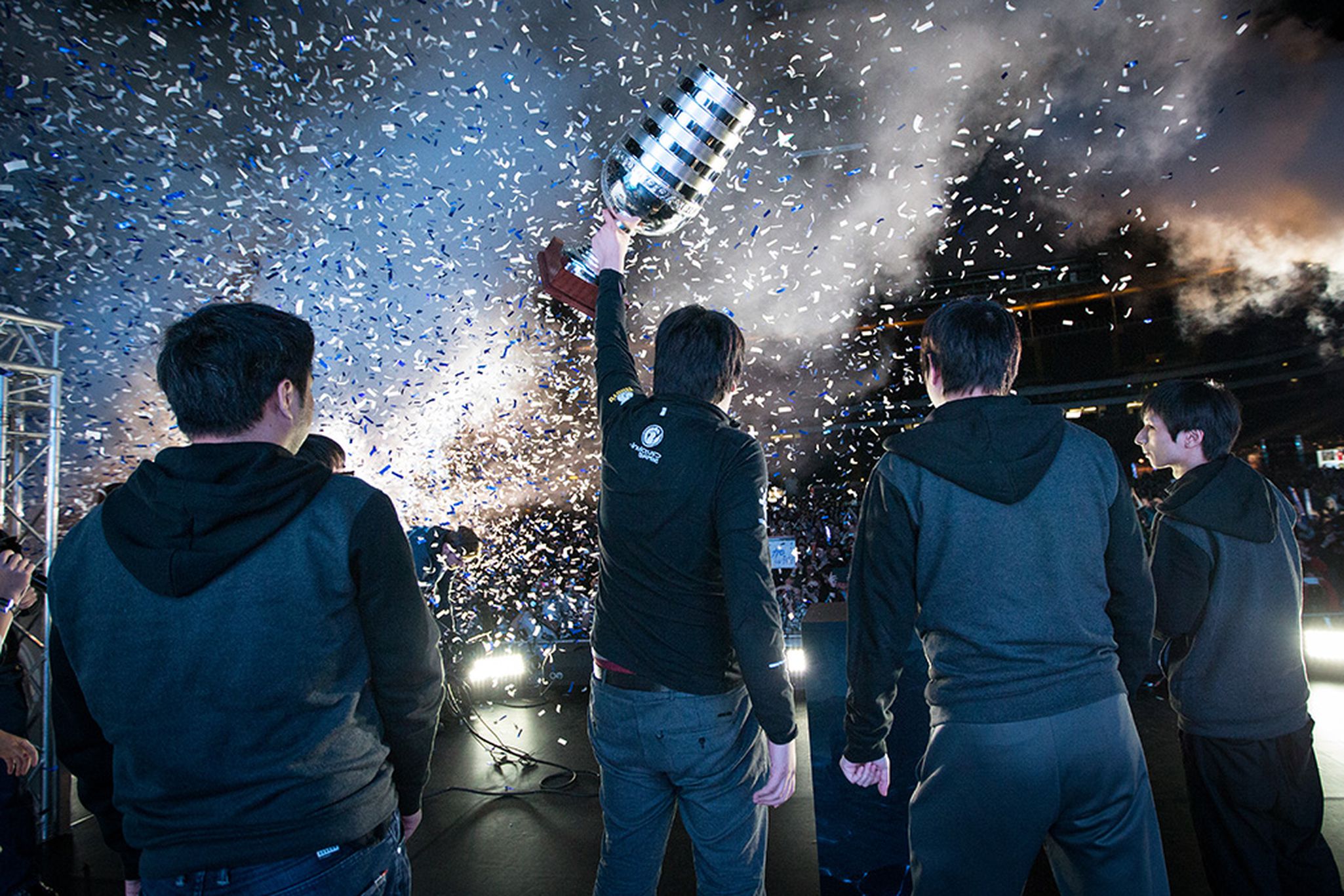
Getting paid to play video games sounds like the cushiest job in the world. Stumble out of bed, fill a bowl of cereal, boot up Steam, and go hunting for thrills and spills. Pants and personal hygiene are optional. That’s the pervasive, and in many cases valid, image of the professional gamer — a layabout with a purpose and a paycheck — but there’s a great deal more to making a living from gaming than meets the eye. Games are usually a leisure activity and an entertainment, but now they’re also generating enough income to sustain entire leagues and multimillion-dollar professional competitions.
To get an insider’s perspective on the rigors and sacrifices demanded by a career in gaming, I spoke with two veterans of the trade: 22-year-old Peter “ppd” Dager and 25-year-old Saahil “UNiVeRsE” Arora from Evil Geniuses (EG). In spite of their young age, both have years of competitive experience and are the most senior members of a five-man squad that includes a pair of teenagers. They carry the EG banner into mythical battle in Valve’s massively popular Dota 2 multiplayer game, which today hosts the grand final of a $10 million tournament known as The International. Captained by ppd, EG came within just one win of reaching tonight’s final against Team Newbee, but in the end had to settle for an honorable third place and a $1 million prize.
The life of a pro gamer requires uncommon discipline and perseverance, because the obstacles to success are as numerous outside the game as they are fearsome inside it. Parents won’t respect what you do, fans won’t understand when you fail, and most of the money goes to only the very best. As tough as that is, passion, team camaraderie, and a growing acceptance of e-sports as a legitimate career path are making competitive gaming bigger than ever.
Like athletic sports, Dota 2 is a young person’s game. Neither ppd nor UNiVeRsE sees himself playing into his 30s, while their 26-year-old ally Clinton “Fear” Loomis is lovingly referred to as “Old Man Dota.” Having participated in each of the previous three Internationals, Fear has been sidelined for this year’s tournament by a chronic arm injury that was originally diagnosed as tennis elbow — and just like with the sport of tennis itself, the game he plays demands the instant reactions and intense focus that a young mind and body are most capable of sustaining.
“Once you reach the top of a competition, you think maybe I can take this to another level where I can turn my hobby into a profession,” says ppd as he recounts the long road to his current position of leading a pro gaming team. He got his start in a game similar to Dota, Heroes of Newerth, and has been refining his gaming craft for over six years. UNiVeRsE began his career around the same time and went through a similar progression.
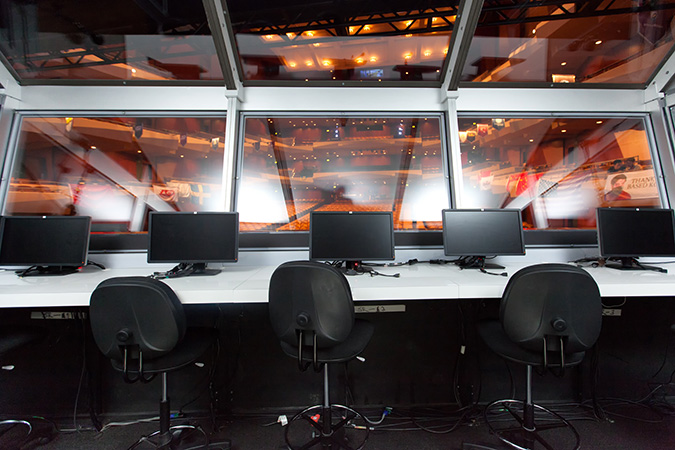
The key thing they agree on is that the jump between playing for fun and becoming a pro depends on someone spotting your talent and recruiting you to an established team — in other words, being scouted out just like a big-arm quarterback playing pitch in the park. As nascent as e-sports like Dota 2 may be, there are already big, professionally organized teams that pay salaries to representatives in multiple games (EG has a fighting game division and rosters of players competing in StarCraft II, Call of Duty, and League of Legends alongside Dota 2).
Without the financial support of a team or committed sponsors, it’s basically impossible to put in the time necessary to refine your skills to the highest level. Juggling pro matches with school or work responsibilities is particularly awkward in the US, where most competitive games are played in the morning. It’s an all-in or all-out affair, and the way the players talk about it reveals the sustained intensity that’s required. ppd speaks of “disengaging” in the afternoon after at least six hours of team practice every day. That’s later followed by playing solo or live-streaming matches on Twitch late into the night. UNiVeRsE adds that there’s also no such thing as a holiday from the game: players take some time off after The International, but otherwise it’s a full-year cycle of perfecting individual play and team strategy.

The Chinese e-sports teams take the commitment to training to its logical extreme by having the whole team live together under one roof throughout the year. They don’t even consider it proper practice unless all five players are in the same room, working as a team. The fruits of these labors are borne out by results at TI4: of the last eight remaining teams, five came from China.
UNiVeRsE openly admits that he wouldn’t be putting in as much time on this game without the allure of The International’s exponentially growing prizes and the monetary backing of his team. Valve, the custodian of Dota 2, made a big splash in 2011 when it announced the first International would have a $1.6 million prize pool. The amount was unheard of then, but this year’s tournament will hand out nearly $5 million just to the winning team. That’s having a trickle-down effect on other Dota 2 tournaments through the year, which has been felt by the likes of Uli Schulze from Turtle Entertainment. Schulze organized ESL One, the last big event before TI4, in Frankfurt’s Commerzbank-Arena this June.
Around 12,500 fans attended two days of live Dota action and the online audience peaked at over half a million simultaneous viewers. “Two years ago, it would have been difficult to make it sustainable at this size,” he says, but the shock waves of interest from The International are bringing in more money and sponsorships from unlikely sources like Coca-Cola and American Express. The other side of that coin is that Schulze now has to cover the travel costs of the teams he invites, while also providing a sizable prize purse to make their trip worthwhile.
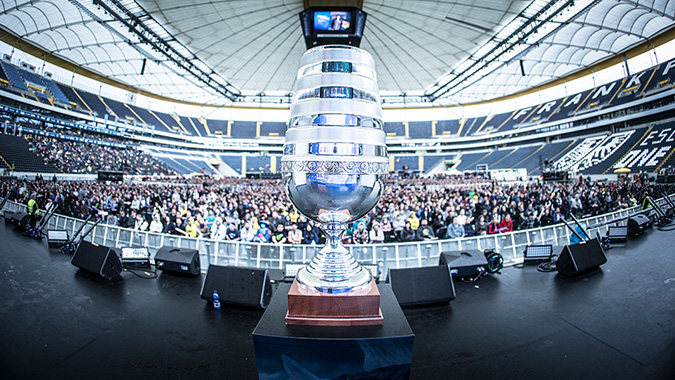
“TWO YEARS AGO, IT WOULD HAVE BEEN DIFFICULT TO MAKE IT SUSTAINABLE AT THIS SIZE.”
Whether using Valve’s Dota approach or the more hands-on strategy of Riot Games paying League of Legends players directly, the financial viability of e-sport competitions and teams is improving constantly. “At the moment, many complain that only the small top percentage of players and industry workers can make a sustainable living, but that number is growing every year,” says Dan Chou, a professional e-sports commentator. He believes “it is the same as with Hollywood or other entertainment industries,” where the most popular performers inevitably take home the lion’s share of the profits.
Everyone who gets into competitive gaming will have to at some point accept a deal with the popularity devil. The late-night Twitch broadcasts that ppd talks about aren’t really optional. EG and the other big teams work hard to raise the profile of their players, funneling fans to their social media channels and online video streams. The player is then expected to be personable and approachable, even though that level of accessibility exposes them to some of the crudest abuse that web trolls can muster. Whereas the din of a crowd at a live event can mask the boos and hisses of naysayers, ppd says “there’s a lot more opportunity for players to view criticism” when engaging so directly with their audience.

PEOPLE CAN BE MORE VULNERABLE ONLINE THAN OFF
The appeal of live game broadcasts, explains pro Dota 2 commentator Toby Dawson, is that “the online world offers viewers real-time interactions and experiences without post-editing, it is raw and in real time which is very attractive.” But when the audience isn’t properly sensitive to the effects of its interaction with the players, that close relationship can quickly turn toxic. Young people who are still developing emotionally are having their passions scrutinized by an unforgiving and sometimes even hostile group of anonymous critics.
“The industry is young and moves at a grueling pace,” says Dan Chou, and “due to the grassroots mentality, many young players and passionate people get exploited.” Painting a picture where “organizations are still loose with details and contracts are pieces of paper,” Chou says there’s still a lot of progress to be made in ensuring players are treated correctly. It’s easy for players to just be grateful for receiving any salary at all and neglect to see how they’re being exploited.
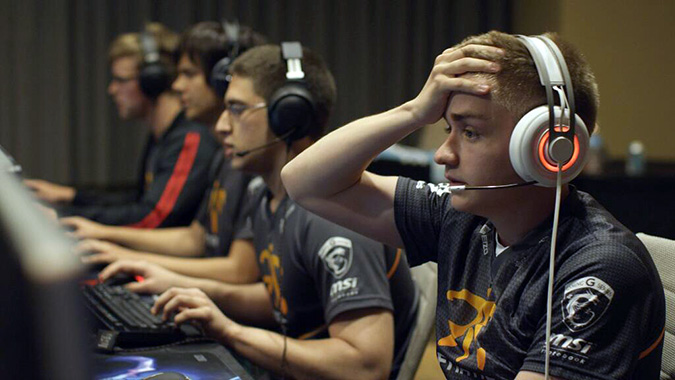
On the other hand, shortcuts to financial success are always tempting and unscrupulous individuals will make them available to the top players. UNiVeRsE has twice been approached with serious bribe offers trying to entice him to lose an important match, while ppd has lost count of the number of people urging him to either win or lose depending on the bets they’ve placed on a game. Some of this is innocuous, of course, but external influences like gambling rings are only going to grow along with the prominence of e-sport tournaments.
Even the legally acceptable exploitation, that of the player’s name and likeness, can be distasteful. There are official team jerseys slathered in sponsor names, and you’ll see appendages like “HyperX” or “DouYuTV” attached to the end of players’ in-game handles. Some like it, others hate it, but in either case, the path to the highest echelons of gaming is laced with dubious product endorsements and awkward glad-handing interviews. Just like other sports.
In hyping up The International 4, Valve this year released Free to Play, an excellent documentary delving into the lives of three players taking part in the first International in 2011. ppd’s injured teammate Fear is one of the trio, representing the American experience, while the Singaporean Benedict “hyhy” Lim and Ukrainian Danil “Dendi” Ishutin give a sense of what it’s like internationally. Despite their radically different origins, there’s a stark universality to their development into professional players. All three clashed with open hostility from their parents and had to pursue their passions in a form of tacit rebellion against the people closest to them. Fear’s mother explains the difficulty well when she says that e-sports are unprecedented and give no history of success that a parent can rely on. Being a trailblazer, even as part of a team, usually means going it alone, at least as far as your closest support network is concerned.
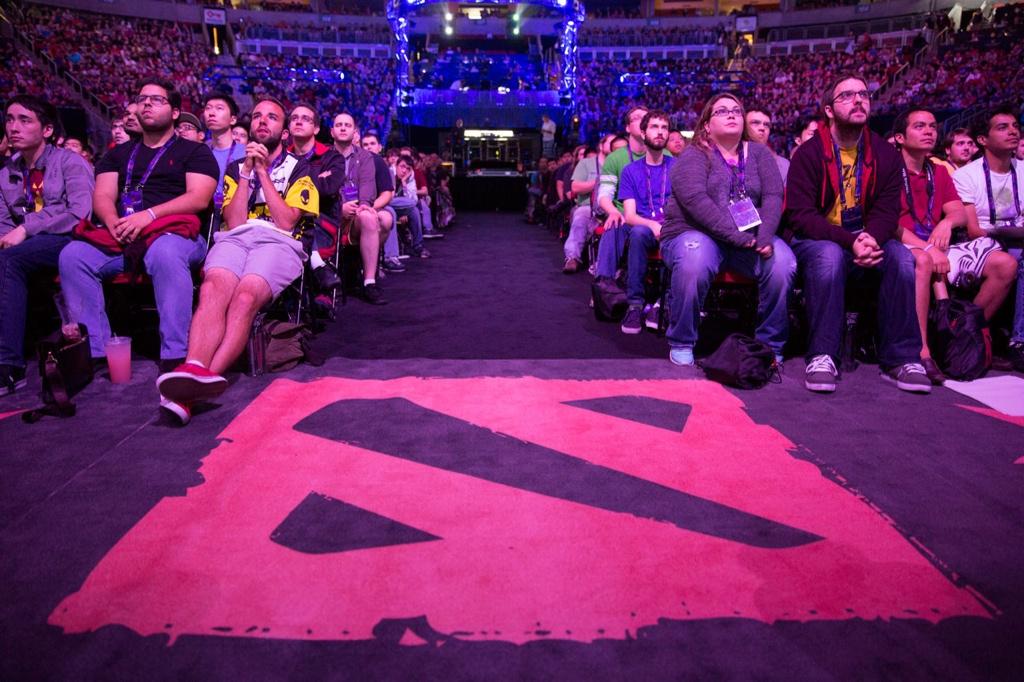
The struggle for the legitimacy of pro gaming is obviously bolstered by TI4’s high profile, big bounty, and constantly expanding audience, but progress remains slow. Bai “rOtK” Fan of Vici Gaming tells of how he only resumed communications with his family after finding some success as a gaming pro. His father is now a passionate fan and follower of his play, but the road to acceptance is a slow and arduous one. The positive side to all of this is that, because everyone has shared in the hardships of becoming a pro, there’s as much camaraderie among teams as there is fierce competition. UNiVeRsE says he felt bad about knocking out incumbent champions Alliance in the group stages, though he was surely consoled by his own team’s progress to the playoffs.
Of all the barriers standing between an aspiring gamer and a professional career, the biggest and ultimately most frustrating one is their gender. Valve has hosted four Internationals and still not a single girl has ever come close to playing in them. The situation is no different in League of Legends, while some other competition organizers have even explicitly segregated their e-sports by gender. Not that it’s necessary to have a top-down edict to discourage girls from trying. The culture and conversation inside games like Dota 2 can often be sexist and unwelcoming to female players, dissuading them from believing that the obstacles to going professional are possible to overcome. Jorien van der Heijden, better known under her streaming handle of “Sheever,” is one of the very few female role models available, and Valve’s choice to feature her as part of the analyst panel for TI4 is a small step toward validating female gamers and their ability to compete alongside their male counterparts.
In the end, says Dan Chou, professional gaming is “still a passion industry.” It can bring wealth and glory to a select few, but the majority of people who pursue it as more than a hobby do so because it’s a awesomely fulfilling thing to do. E-sports are competitive thinking distilled to its purest form, and the best among them convey a true sense of achievement and failure with every move a player makes. Dota 2 is like team-based chess with gore and explosions. Jeremy Lin calls it a way of life and even T-Mobile CEO John Legere is psyched about it.
Being a professional anything inevitably requires dedication and hard work, plus the acceptance of some risks and sacrifices. Gaming has more of those than is commonly understood, but right now it also carries greater potential for reward than at any other time. “People just need to open their eyes to a new age of competitive sports,” says ppd. “With technology advancing every day, there’ll be more and more advances like this.” What that will mean for the necessity of pants in professional gaming has yet to be determined.
[“source=theverge”]








